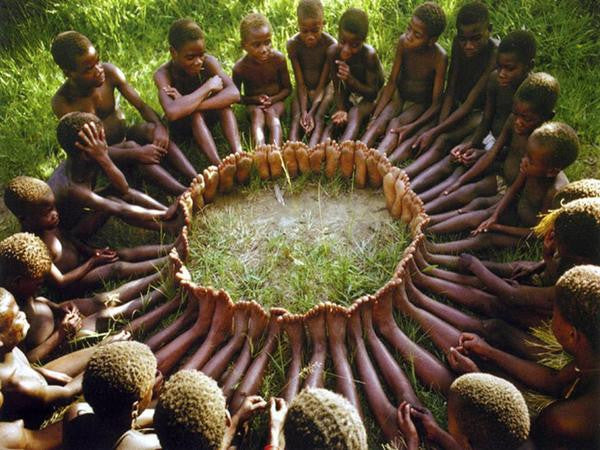
“When people see this image, it draws their attention. When they read what it’s about, they fall in love.
We came across this image and the story behind the Osani Circle Game a few weeks back on Tribe member Emilee's Facebook wall, and it definitely caught our eye. For obvious reasons. The story that was circulating the social media world differed a bit from the story we found when we dug a little bit deeper. In each of the stories we found, though, we learned something. And, in the spirit of celebrating and promoting world culture, we thought we'd take the time to share it with our Tribe. Here goes.
The story circulating on Facebook taught us that we are much better when we work as a team and think about the community before ourselves. It taught us that we can achieve so much more when we approach situations with the mindset that we are a team and focus on cooperation rather than competition. This is a message that resonated with us, too, when watching the documentary I AM.
"Today I read a story about an anthropologist who proposed a game to the kids in an African tribe. He put a basket full of fruit near a tree and told the kids that who ever got there first won the sweet fruits. When he told them to run they all took each others hands and ran together, then sat together enjoying their treats. When he asked them why they had run like that as one could have had all the fruits for himself they said: Ubuntu, how can one of us be happy if all the other ones are sad? Ubuntu in the Xhosa culture means 'I am because we are'."
The story of the Osani Circle Game (courtesy of
Connecting Dotz) goes as follows:
Efé children of the Ituri Forest in Zaire (Rep. of Congo, central Africa) begin the Osani game by sitting in a circle, feet touching, all connected. Osani is the Efé word for love. Each child in turn names a round object like the sun (oi), the moon (tiba), a star (bibi) an eye (ue) and then goes on to name a figurative expression of “round” like the circle of the family, togetherness, a baby in the womb, or the cycle of the moon. As players fail to come up with a term that is “circular” they are eliminated from the game. Eventually, only one remains. Tradition has it that this player will live a long and prosperous life.
What we love so much about this concept is the connectedness these children covet, and the closeness of this community. The very game is about a circle of connection and togetherness...of community and creativity, and enjoying each other's company and celebrating the different perspectives each of them bring to the circle.
While researching the web to learn more behind this image and its story, we came across
Marisa Ranieri's Tanzania 365
blog and were drawn in by her words:
"Regardless of which story moves you the most, they all maintain a similar trope. Loyalty, and success and/or failure as a group becomes more important than the goals and/or possibilities of any one individual. In Kenya, my friends and I always used to say tunakaa pamoja which means both 'we stay together' and 'we stay as one'."
Can you imagine how much better the world would be if everyone lived by this motto?"
Tribe: we'd like to echo Marisa's sentiments, and we'd like to leave you with that very question. What would the world be like if we all lived by the motto tunakaa pamoja or ubuntu and focused on working together for the greater good, rather than against each other for the good of ourselves? That's why we feel blessed to be a part of something bigger...to be a part of a Tribe that focuses beyond ourselves and rather on doing good for the whole, and celebrating the differences in this world.
Tunakaa pamoja / Ubuntu,
The Tribe Scribe


